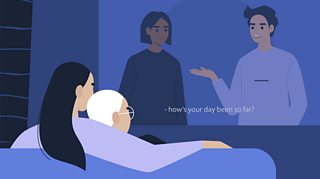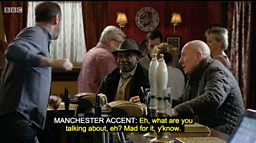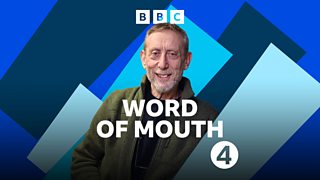Word of Mouth: The power of subtitles to help us hear

Karli Witkowska is a subtitler for films and TV shows, including Stranger Things. On Word of Mouth she explains to Michael Rosen how creative descriptions like “wet squelching” and “swarm chittering” enhance the experience for deaf and hard of hearing viewers – and how the future of subtitling will encompass plays and even podcasts.
-
![]()
Word of Mouth: Subtitles
Subtitles have always been important for the deaf community, but now more of us are using them than ever before. Michael Rosen explores the ins and outs of subtitling with film and TV subtitler Karli Witkowska.
Binge watching has led to more of us using subtitles
Subtitles have always been important for the Deaf community, but now more of us are using them than ever before. It could be due to increased access to content, says Karli.
“We surface watch things a lot, especially when we’re into this new thing we like to call binge watching… Having online streaming services and having an abundance of content to consume at any given moment means that we don’t focus as much.”
But it has shone a light on accessibility, and a service for the Deaf community, that was never there before. “Now we have social media posts and online articles that are talking about the subtitles that have been there in our culture for quite a long time,” says Karli.
How the subtitling process works
Karli doesn’t work on live subtitling – only pre-recorded, edited content. She’s often provided with scripts and resources in advance, including phrases that have to be produced in a certain way, as well as the video content.
If it’s subtitles for the deaf, she will often already have a pre-prepared English version and will then add all the aspects needed for the deaf community. If it’s foreign language content, she creates English subtitles from a translation that is provided to her. And if it’s “empty content”, with no existing subtitles, she’ll do that from scratch, working through frame by frame: “I work from the very beginning to the very end adding the subtitles.”

Capturing nuance for the Deaf community
Speech is full of pauses, wrong turns, “ums” and “ahs”. Karlie tries to capture every nuance in her subtitles because the aim is for the deaf community to be able to interact with the exact dialogue that an actor presents. “We’re trying to reproduce the closest experience to the original content as possible,” she says.
'Ferocious guitar riff' helps those born deaf understand the emotion behind the sound.
“If I was working on subtitles that weren’t for the deaf, for example English subtitles or English content that were then used for a translation for a Spanish audience or French audience, I might not add all of those nuances in,” she states. “But certainly when I’m working with the deaf community I would try to reproduce those things as clearly and as carefully as possible.”
Creative descriptions of sound can conjure emotion
This is the area in which Karli and her colleagues let their “creative juices flow,” she says. “We try our best to provide subtitles that are as clear and describe the sound as perfectly as we can.” Examples from Stranger Things include “wet squelching”, “tentacles undulating moistly” and “swarm chittering.”
The level of creativity will vary depending on the content and the genre, she says. “If we’re working on something that’s built around its soundscape, like a show where the music is intended to change tone and mood and provide emotion, these creative descriptors would be thought through much more.” If it’s a serious documentary with little background music or sound effects, descriptions will be a bit more generic.
Crucially, subtitles have to cater for those profoundly deaf from birth who have no knowledge of particular songs or genres, and those who are hard of hearing or who lost it later in life. So, they won’t shy away from naming a particular song or genre but will always describe it with an “emotional aspect” too, for those who have never heard it. For example, “ferocious guitar riff” helps those born deaf understand the emotion behind the sound. With an upbeat, period piece they might use the word “jaunty” to describe the music. “It’s creating an idea of what a sound is like and using a very descriptive word in order to do so,” explains Karli.

"Tentacles wetly squelching..."
Karli Witkowska explains how a descriptive phrase almost came to define a programme.
Subtitling comes with rules
“There are a lot of guidelines, especially for accessibility subtitles,” says Karli. “We have an extensive set of guidelines which provide the Deaf community with the best and most comprehensive subtitles with regard to reading speed etc. But that also can be the case for foreign language films or other types of content.” Guidelines might include limiting the subtitles to two lines on the screen, or dealing with shot changes in a certain way.
Censoring swearwords in subtitles
Whether swearwords and profanities are typed in full all depends on where the content was intended for, says Karli. “On online streaming services there perhaps would be less of a need to censor because it’s not going to be shown at four o’clock in the afternoon.”
“We’re often given instructions on whether censoring should take place. A lot of the time it shouldn’t because the original content was intended that way so why shouldn’t the subtitles be?”

Subtitle fails
With live subtitling, mistakes can be commonplace. Previous gaffes include “MMR injections are for 99% protection against meatballs” or – according to some Wimbledon coverage – “we might be bad at some things in the UK but we’re so good at killing.” (The correct word was queuing.) One set of subtitles for the news stated, “We cannot allow Batman to become our prime minister.” (It should have been “that man”.)

Live subtitles are “created in a very high intense, pressurised environment,” says Karli, with the words appearing on screen almost directly after they’re uttered. Any errors are often corrected immediately!
In the future we’ll see subtitled theatre, opera, radio shows and podcasts
Some countries still predominantly dub their content and subtitling for the deaf community is a very new concept but, here in the UK, we’ve had subtitles on TV for a very long time. “We’re quite a forerunner when it comes to subtitling for the deaf and hard of hearing. We have really taken a step forward for accessibility,” says Karli. However, “there is still a long way to go.”
“There are multiple campaigns now, especially in the UK, that strive to provide more accessible stage shows, gigs, and I’ve even been to subtitled opera… In the coming years that will be something that you will see a lot more.” She’s already come across a podcast that’s been recorded as a video version with subtitles.
“Being deaf shouldn’t preclude the deaf community from being able to enjoy cultural arts,” says the subtitler. “It shouldn’t take that away from them.”

A world of words on Radio 4
-
![]()
Word of Mouth
Exploring the world of words and the ways in which we use them, with Michael Rosen.
-
![]()
Exclamation Marks!! Why do we love to hate them?
The history behind the first symbol to indicate emotion.
-
![]()
Ghosting, caking and breadcrumbing: The language of online dating
Cyber-psychologist Dr Nicola Fox Hamilton breaks down the lexicon of internet romance.
-
![]()
Are you grammatically gormless or a punctuation perfectionist?
The Great Apostrophe Quiz: sn entertaining quiz to illustrate the trickiest of punctuation elements – the apostrophe.





